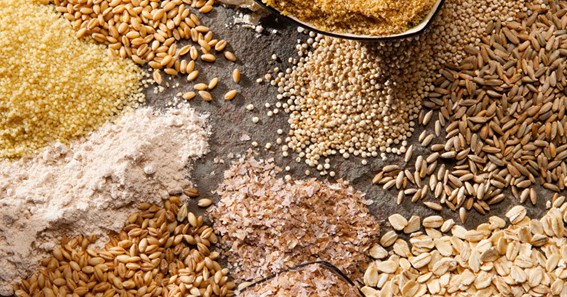For several years, in different parts of the world, whole grains have been consumed in meals prepared in a variety of ways by wheat flour manufacturers, such as Vikram Mills, in order to suit the health needs of people, specific to those regions. There are several health benefits of eating whole grains.
Some popularly known forms of whole grains consist of oatmeal, millets, quinoa, brown rice, buckwheat, and more. These are usually incorporated in items like bread, pasta, as well as breakfast cereals.
Apart from mere bodily benefits, it also provides relaxation and reduces mental health risks such as hypertension or extreme stress tendencies.
Click here – Calculate the accurate amounts with an online brokerage calculator
Read on to know more health benefits of eating whole grains.
Table of Contents:
- Contains abundant amounts of fibre
- Assists with digestion
- Reduces cholesterol levels
- Regulates blood pressure
- Allows ease of weight management
- Reduces risk of asthma
- Decreases risk of cancer
- Delivers needed vitamins and minerals
- Lowers risk of heart problems
Health Benefits of Eating Whole Grains:
- Contains abundant amounts of fibre:
A kernel of whole grain is usually composed of three layers, namely the bran, the endosperm, and the germ. The bran component is the harder outer shell which contains fibre, minerals, and antioxidants. Fibre is a rich type of carbohydrate which helps in producing various health benefits. It is also rich in a number of vitamins, magnesium, zinc, and other proteins.
- Assists with digestion:
Since whole grains consist of the richness of fibre, not only does it assist in the proper flow of digestion, but it also allows cleansing harmful and unnecessary toxins from your body. Even the antibacterial properties of whole grains help reduce adverse consequences on digestive tracts and enhance the overall intestinal health of the digestive system. Having a proper digestive system eventually benefits and has a positive long-lasting impact on your body and health.
- Reduces cholesterol levels:
Consuming whole wheat flour or whole grain within your diet helps in reducing LDL (Low-Density Lipoprotein) cholesterol and the total cholesterol, but it does not reduce HDL (High-Density Lipoprotein) cholesterol, or triglycerides when in contrasted with non-whole grain-related foods and diets. Among all, whole-grain foods, such as oats, appear to be highly effective in lowering cholesterol in your body.
- Regulates blood pressure:
Whole-grain foods consist of an abundance of potassium. With the increase in the potassium level in your body, your body’s health can be linked to regulating and therefore reducing blood pressure levels. Plenty of research supports that eating a diet or meal rich in whole grains helps with heart issues, blood pressure, diabetes, and more. Foods such as quinoa, oatmeal, and brown rice work nicely for this purpose.
- Allows ease of weight management:
Extensive research in the domains suggest that eating foods that are rich in fibre can assist with managing weight in terms of increasing or decreasing weight, as per your body’s needs. Reducing weight helps in managing the risk associated with obesity. Whole grains aid in cutting down fat that is bad for you from the body and redistributes it evenly within the body. The body mass index is lowered when a person has three meals consisting of whole wheat on a regular basis.
- Reduces risk of Asthma:
Eating whole-grain foods also plays a vital role in helping reduce the symptoms and risks of asthma in your body. Rich in fibre, these foods prevent constipation and enhance the digestive process, making the flow of oxygen in blood better.
A study conducted a few years back found that people who tend to have followed a balanced plan in their diets, and had included whole-grain foods, have a far lower risk of experiencing asthma as well as have better control of all their medical conditions.
- Decreases risk of cancer:
A lot of studies support the notion that eating whole wheat grains in your diet helps reduce the risks associated with skin cancer, and other types of harmful diseases as well. The selenium present in whole wheat grains helps with these processes, as well as helps in nourishing your skin and maintaining a radiant complexion. Whole wheat also has the quality of eliminating or removing the chance of colorectal cancer from your system, which is a widely recognized type of cancer.
- Delivers needed vitamins and minerals:
Whole wheat grains or whole wheat flour contains a rich variety of vitamins, fibres, magnesium, zinc, and proteins useful for the body. Whole wheat flour or grains consist of high amounts of Vitamin B. Antioxidants are also found in abundance in whole wheat foods.
These vitamins are essential for maintaining health and general well-being.
- Lowers risk of heart problems:
Incorporating whole wheat flour or whole wheat grains as opposed to any alternative types of flour is significantly better for heart patients as well as people prone to or suffering from diabetes. Whole wheat flour consists of high amounts of fibre. Fibre helps in keeping the health of your heart and body in check, all while preventing any chances of you having to deal with potential heart problems by managing your levels of cholesterol as required by the body.
Conclusion
In India, different regions consist of different kinds of foods and flavours, but all of them have one thing in common – whole wheat flour is used in some form or the other. There are several health benefits of eating whole grains, and is dear to Indians in their diets. Whole wheat grains or whole wheat flour is infamous in India owing to its innumerable health benefits, some of which are listed above.
Click here – Foods to Eat When You are Pregnant



